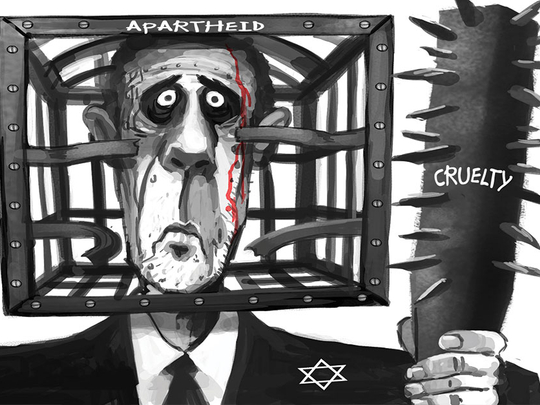
It is like Jews to ask questions.
In the Old Testament, the first sentence speaks of how “at the beginning was the word”, but the book never explains what comes at the end. That’s why Jews — and take your hat off to the intellectual acumen of Jewish thinkers — have for centuries been obsessed with seeking answers to major questions about the objective reality they inhabit.
The question du jour that Israeli and American Jews — all the way from New Historians like Avi Shlaim, political analysts like Uri Avneri and philosophers like Omri Bohem in Israel, to linguist Noam Chomsky, novelist Philip Roth and social critic Peter Cohen — are asking these days, almost with axiomatic presumption of the answer, is this: Is Israel heading towards isolation, decline and self-destruction?
It is not unusual for human beings to meditate, especially when driven by a teleological bent of mind, on their own culture’s potential ruin. Indeed, a good deal of the lunacies of the two great wars in the first half of the 20th century was, for example, anticipated in the art, literature and political theory of the previous decades, when la belle epoque was at its peak of serenity. Moreover, when we ask if there is a future for Israel in the Holy Land, we may be doing more than ask a question. We may be, albeit unconsciously, part of a force of prevision.
It is a famous saying of Karl Marx — a messianic Jew who asked the ultimate question relating to the Eden of the classless society — that human beings do not ask seminal questions until “there is an objective possibility of an answer”.
The question about whether Israel is about to die is not a nihilistic question for Jews, or a playful one for others, to raise. Given the entity’s perverse longing for confrontation, its penchant for cruelty and, above all, its failure to achieve the goals that the Zionist experiment in Palestine set out to achieve, the question is relevant, timely and urgent.
Israel has not only mercilessly oppressed Palestinians, but dismally failed Jews. Look at it this way. Israel was established as a “haven” where Jews would be safe, but the fact is that the only place in the world today where Jews are not safe, where their existential fears are paramount, is Israel. The irony thickens when you consider how, by its actions, Israel has acted as trigger for anti-Semitism around the world. The reason? Israel’s self-definitions, which include the assertion that the state of Israel belongs not to its citizens, but to Jews — wherever Jews may be found. From that we get the corollary that Jews living outside this entity, as the Israeli philosopher Omri Boehm wrote in a scathing article in the New York Times last month, are mere diasporic folks, inhabiting a country not their own. Thus, when Israel subjugates Palestinians, robs them of their land and commits unspeakable violence against them in Gaza, people who do not know any better turn anti-Jewish, not anti-Israel. In short, Theodore Herzl’s fantasy about a country without a people for a wretched, long-persecuted people without a country ended up morphing into a state bristling with nuclear weapons, swinging its big ego around, bullying its neighbours and bombing their homes and infrastructure to rubble.
Today Israel has lost its friends even in Europe and is left with support only among dubious ones in the United States. It is still, after all these years, an outremer state (much like the Crusader Kingdom in Jerusalem had become after 1099) dependent for its survival entirely on the diplomatic, economic and military largesse of the US.
That largesse, however, is not a constant but a variable in the historical equation. American priorities shift and America itself may lose its footing as a big power. That’s when Israelis will be left alone. That’s when Israel’s springs of life will dry up. That’s when Jews in the Holy Land will come to realise that their survival as a society, as a people, as a state, should’ve been contingent all along on alliances with their neighbours, not outremer.
But it will be too late then to dust off the Arab Peace Initiative, endorsed by the Arab League in 2002 (and re-endorsed in 2007), which called for normalisation of relations with Israel in exchange for a full withdrawal from the territories occupied in 1967, territories comprising less than 20 per cent of the Palestinian people’s ancestral patrimony.
Yes, Israel is now a full-fledged apartheid state that has harnessed its energies to the yoke of conquest, colonial expansion and the subjugation of a helpless people by the rule of the gun. And yes, Israel is dying. You see it in the corrosive ennui, the itch to lash out, the thickening at crucial nerve-ends of that entity’s social and political life. And you see it not only in the brazenness of Israel’s colonisation project, but in the implosive language of its leaders. And let’s face it, every person has, in its language, a unique body of shared secrets. Read the language and you will see it all there.
You will see how below the outwardly serene garden surface, there are anarchic compulsions at play. And you will see the death of Israel coming with a whimper, not a bang, a slow passing away of an apartheid state. I will see it through the simplest of metaphors — a fire dying in the grate.
Fawaz Turki is a journalist, lecturer and author based in Washington. He is the author of The Disinherited: Journal of a Palestinian Exile.







